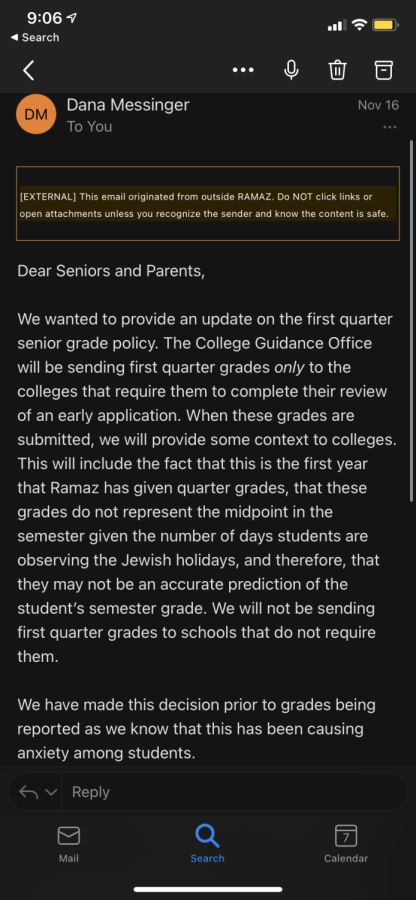More Grades?
Along with Ramaz’s rigorous school day, co-curricular schedule, and test calendar, the administration has decided to start giving students first quarter grades.
Mr. Blumenthal, the Director of College Guidance at Ramaz, shared his views on the topic with us. He began by explaining why the Ramaz administration decided to implement this change this year. Regarding the seniors, the college office began realizing that colleges are starting to ask for first quarter grades more often. “Considering that the majority of the students at Ramaz apply Early Decision or Early Action, meaning that they apply on November 1st and receive decision letters in mid-December, colleges cannot wait for first semester grades, they need an early data point to be able to evaluate the students correctly and early enough to decide whether or not to accept them into their school.”
Regarding the underclassmen, Mr. Blumenthal doesn’t completely understand the reasoning behind instituting this change considering underclassmen don’t need to make a deadline for colleges. Although, he does see a benefit for underclassmen in this new system. He believes that it is an easier way to gauge where a student is at the start of the semester, including participation and homework grades as well. He also noticed that “Ramaz students like to see numerical values on their progress, rather than just anecdotals or student-teacher conferences where teachers merely discuss students’ progress.” He thinks quantitative data points are more effective than progress reports in helping students and teachers assess how to progress. While Mr. Blumenthal was not involved in the decision to include first quarter grades this year, he believes it is the best decision for seniors. He knows that the leadership team contemplated this change for a while, and finalized the decision in August. Mr. Blumenthal said that the leadership team, “decided that the best way to track students’ progress is through numerical grades and not merely through anecdotals.”
Furthermore, this change will help teachers outline their anecdotals. This way, the first quarter evaluations as a whole, including grades, anecdotals, and student-teacher conferences will be a more organized process to correctly understand how a student should continue their semester.
A major concern that arose from this change is the level of stress Ramaz kids will undergo considering they will have an additional grade to worry about on report cards. Mr. Blumenthal believes that this change is beneficial for students because it will not appear on any official transcript for underclassmen, meaning that it is simply for purposes of evaluation and analyzing progress at the start of the semester. He is hoping that this grade will induce greater academic performance, homework completion, and participation in classes. After the first quarter, a student will know which areas need improvement and how much they need to improve.
This change seems drastic surrounded by all the other changes this school has implemented this year, like the new schedule and elevator policies. Mr. Blumenthal agrees that it is, “hard and bold to change a lot at once,” but this change is necessary for seniors based on colleges’ expectations, and was ultimately inevitable for seniors. And for underclassmen, it will become a more accepted change to encourage students to progress quicker earlier in the year. Although this year was difficult for first-quarter grades since we barely had school in September, this change will hopefully have more grades in the future to base this evaluation on. In an effort to battle this problem for seniors, the seniors have already begun their second round of testing. This in itself has outraged some seniors, but the college office has hopes that it will end up doing more good than expected.
Another problem that arises for seniors is that first quarter grades may hurt their chances of getting into their colleges of choice. Students’ chances of being admitted to a school could be ruined by one bad grade on the first test in one class. Therefore, the college office decided to be more conscientious about sending in their grades to different schools. They plan to compile all the student’s grades and determine whether or not sending their grades in will be beneficial. They will determine based on each school if the majority of students applying have good grades that overall match up with their applications.
While the College Guidance office initially announced that they would be sending first quarter grades to all schools, they later redacted their policy, stating that they would only send first quarter grades to colleges that required them. Mr. Blumenthal stated that he didn’t feel like it was necessary to send first quarter grades to schools that didn’t require them because Ramaz hadn’t sent them in the past, and it simply wasn’t necessary to start now if they didn’t need to. Furthermore, the chagim in September and October influenced the amount of tests and assignments that seniors were able to complete, and some teachers did not have enough grades to fairly assess students’ performance in their classes.
Overall, students and teachers alike are wondering whether or not this change will persist. Mr. Blumenthal believes that since colleges are beginning to require this more and more, this change will most likely persist for seniors, and almost definitely for next year’s seniors. Regarding underclassmen, considering there’s no harm being done to students, there is no reason not to keep it, especially since it gives another way for both teachers and students to evaluate their progress for the start of the year. The college guidance and administration are continuing to consider the advantages and disadvantages of this new system.



